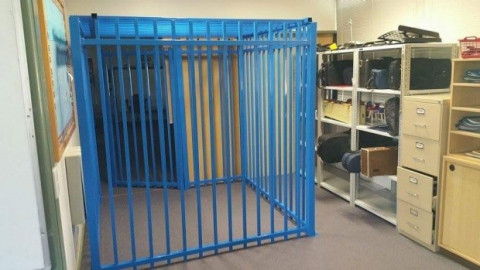
A leading international human rights group has highlighted the decision to place a 10-year-old autistic student in a metal cage as a violation of disability rights in Australia.
Human Rights Watch, one of the world's most respected campaign organisations, detailed the incident in its latest annual report on abuses and concerns in Australia.
The cage, which was two metres square in size and had a self-closing latch and door, cost $5195 and was not approved by the ACT Education Directorate.
The cage was in place for 17 days and was initially described to parents as a "sanctuary" for a boy with special needs and behavioural problems. It was dismantled a day after government officials became aware of its existence.
The school principal was stood down by former education minister Joy Burch after an inquiry found she was the sole instigator of the decision.
Ms Burch, who faced motions of no confidence from government teachers and a disability support group for her handling of the incident, resigned from cabinet last month.
"In September, a school principal was fired for building a metal cage in a classroom and using it to restrain a 10-year-old boy with autism," the Human Rights Watch report said.
"The incident prompted an inquiry into how schools respond to students with 'complex needs and challenging behaviours'."
The review, released in November, called for major reform of the territory's schooling system, including an urgent review of funding for students with special needs.
Led by University of Canberra disability education expert Professor Tony Shaddock, it also called for training for teachers and greater support for principals trying to balance safety with potentially violent students.
Disability Rights Law Centre general manager Christina Ryan said the international attention proved that "a systemic change" was needed in Australia.
"This is one of the major global independent human rights monitoring bodies and the fact they have mentioned disability as one of the concerns in the report is significant," she said.
"Australia was one of the first countries to sign the United Nations Convention on the Rights of Persons with Disabilities and we have a national strategy to implement its goals, but something like this still happens in our schools."
Ms Ryan said the Canberra case was not an isolated incident and governments throughout Australia needed to show real leadership to change attitudes and raise awareness of disability rights.
"Everybody gets shocked when they see these stories in the media, and rightly so, but a similar case was reported in Victoria only a few months later," she said.
"This tells us there is something wrong with the way we respond towards people with disabilities in this country."
In October, Australia's largest autism service provider was investigated after staff built a large wooden box to lock up distressed clients at a Melbourne day centre.
Disturbing images show that the box was fitted with a metal lock and kept inside a classroom at Autism Spectrum Australia's (Aspect) site at Heatherton, in the city's south-east.
The two-metre-tall box was to have had egg cartons fitted inside for sound proofing. Clients with autism had painted the exterior as decoration.
from http://www.canberratimes.com.au/act-news/human-rights-watch-condemns-boy-in-cage-affair-in-national-report-20160202-gmjxm0.html
The relevant section of the Human Rights Watch report says:
Disability Rights
Women and girls with disabilities in Australia face higher rates of violence in the community and in institutional settings than other women and girls. Some face coerced sterilization and forced psychiatric interventions. To date, the Australian government has done little to address such violence.
In September, a school principal was fired for building a metal cage in a classroom and using it to restrain a 10-year-old boy with autism. The incident prompted an inquiry into how schools respond to students with "complex needs and challenging behaviors."
According to the AHRC, people with intellectual disabilities are overrepresented in the prison population and have limited access to justice. There is also a lack of community-based independent living arrangements and support services for people with disabilities.